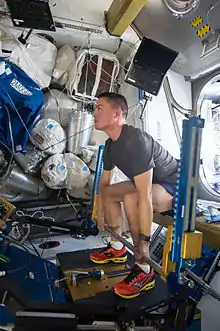Advanced Resistive Exercise Device
The Advanced Resistive Exercise Device (ARED) is an exercise device designed by NASA to allow for more intense workouts in zero gravity. The device was flown to the International Space Station during STS-126[1] and installed in 2009 to replace its inefficient predecessor, the Interim Resistance Exercise Device.[2] The device uses a system of vacuum tubes and flywheel cables to simulate the process of free weight exercises, such as squats, deadlifts, and calf raises,[2] workouts which more effectively prevent lower muscle atrophy, though it has the capability to workout any muscle group.[1] The ARED device can accommodate all astronauts on the ISS.[2]

Astronauts can lose approximately 15% overall muscle mass throughout a long mission and up to 30% of their lower-body muscle mass.[3][4] The reason for the change from iRED is that the ARED can deliver up to 600 pounds-force (2,700 N), double that of the iRED.[5] Specifically, the ARED can support 600 lbf (2,700 N) for bar workouts and 150 lbf (670 N) for cable workouts.[5]
The device works through the use of two mechanisms:
See also
References
- "The International Space Station Advanced Resistive Exercise Device | Patent Details". technology.nasa.gov. Retrieved 2020-04-14.
- "Advanced Resistive Exercise Device | Experiment Details". www.nasa.gov. Retrieved 2020-04-14.
- English, Kirk L. (January 1, 2008). "Reliability of Strength Testing using the Advanced Resistive Exercise Device and Free Weights". NASA Technical Report.
- LeBlanc, A.; Schneider, V.; Shackelford, L.; West, S.; Oganov, V.; Bakulin, A.; Voronin, L. (December 2000). "Bone mineral and lean tissue loss after long duration space flight". Journal of Musculoskeletal & Neuronal Interactions. 1 (2): 157–160. ISSN 1108-7161. PMID 15758512.
- Lamoreaux, Christopher D. (May 1, 2006). "Mechanism Development, Testing, and Lessons Learned for the Advanced Resistive Exercise Device". 38th Aerospace Mechanisms Symposium: 317–330 – via NASA/CP-2006-214290.